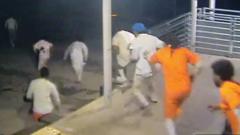NEW ORLEANS (PulseWire News) — The race for the Clerk of Criminal Court in New Orleans has escalated into a highly personal and contentious battle as candidate Calvin Duncan, who spent 30 years in prison before his conviction was vacated, faces fierce criticism from Louisiana’s attorney general and the incumbent clerk.
Duncan, 62, who has self-taught himself law while incarcerated, views his candidacy as a deeply personal mission. I don’t want anyone else to endure what I went through, he stated, referring to the ordeal of being wrongfully convicted of murder. His conviction was overturned by a judge in 2021, and he is recognized in the National Registry of Exonerations.
However, Duncan's campaign has been marred by disputes regarding the nature of his exoneration. Attorney General Liz Murrill and current clerk Darren Lombard deny Duncan's innocence, citing a 2011 plea deal for manslaughter, which he claims he accepted under duress. Lombard has publicly called Duncan a murderer, heightening tensions as the election approaches this Saturday.
“It’s an effort to mislead voters,” Duncan contended, asserting that his opponents are engaging in desperate tactics. There are over ten other candidates vying to replace term-limited Mayor LaToya Cantrell, whose own legal troubles have captured headlines.
Jessica Paredes, the executive director of the exoneration registry, supports Duncan's claim, stating his case unequivocally meets the criteria for exoneration. Duncan's conviction was vacated after he presented compelling new evidence, including claims of police perjury.
The tension escalated recently when Murrill accused Duncan of “gross misrepresentation” regarding his status as an ex-convict. In a legal battle for compensation for his wrongful conviction, Duncan was advised by his attorney to withdraw his claim to protect his ability to practice law.
As a self-taught lawyer, Duncan has made strides in the legal field, contributing to a 2020 U.S. Supreme Court decision that abolished non-unanimous jury convictions in Louisiana. He faces a challenging landscape, advocating for a digitized court record system to prevent mismanagement seen in the past.
As voters prepare to cast their ballots, the outcome of this election could hinge significantly on the perceptions of Duncan's harrowing past and the narratives shaped by adversaries in this polarized political environment.



















